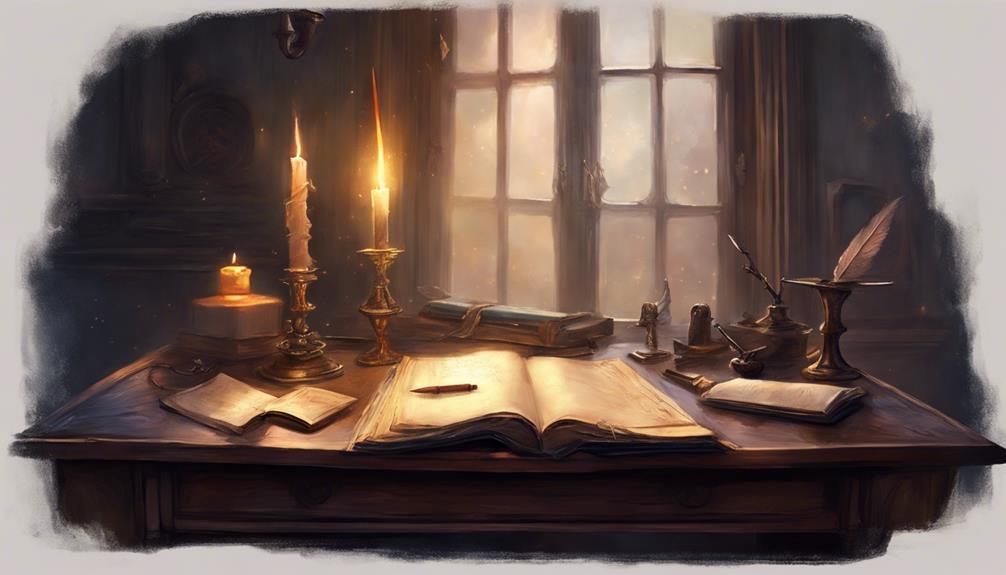Like a mirror reflecting back the parts of ourselves we often choose to ignore, shadow work demands courage and honesty. As you stand at the precipice of self-discovery, imagine holding 14 keys, each unlocking a door to a hidden room within your psyche.
These powerful journal prompts guide you through unveiling your fears, recognizing hidden emotions, and exploring childhood memories, among other profound topics. You're about to embark on a journey that promises to illuminate the darkest corners of your being.
Why continue? Because understanding your shadow is the first step toward true personal freedom and transformation.
Unveiling Your Fears

Diving into the shadowy depths of your psyche, let's uncover the fears that hold you back. You've likely noticed moments when fear grips your heart, not the kind that warns you of danger, but the sort that whispers doubts and uncertainties into your ear. These fears, often hidden, can shape your decisions, relationships, and even your self-esteem without you realizing it.
To embark on this journey, you'll need courage and honesty. Start by asking yourself, 'What am I truly afraid of?' It's not just about identifying these fears but understanding their origins. Did a past experience plant a seed of doubt in your mind? Are these fears tied to messages you received in childhood?
Recognizing these fears is the first step in reclaiming your power over them. You're not trying to eliminate these fears; that's an unrealistic goal. Instead, you're learning to acknowledge their presence without allowing them to dictate your life. This process isn't about finding quick solutions but about fostering a deeper understanding of yourself. Through this exploration, you'll discover not just the fears that have been holding you back but also the strength you possess to face them head-on.
Recognizing Hidden Emotions
Peeling back the layers of your psyche, it's time to explore the emotions lurking beneath the surface, often unnoticed yet profoundly influential. You've navigated through unveiling your fears, and now, it's crucial to recognize the hidden emotions that shape your reactions and interactions daily. This process isn't just about identifying these emotions but understanding their origins and how they influence your current state of being.
To guide you on this journey, consider the following journal prompts:
- What emotion do you feel when you think about your biggest challenge, and why do you think it triggers this response?
- Recall a recent situation where you overreacted. What were you really feeling, and what might've been beneath that initial emotion?
- Describe a moment when you felt a strong emotion but chose to suppress it. What was the reason for suppressing it, and how did it affect you afterward?
Exploring Childhood Memories

Having explored the hidden emotions that shape our daily lives, let's now turn our attention to the roots of these feelings by examining our childhood memories.
Reflect on the earliest memory you can recall. What were you doing? Who was there with you? How did it make you feel? It's often these formative experiences that set the stage for patterns we carry into adulthood. Childhood memories, both joyful and challenging, shape your understanding of the world and influence your reactions to it today.
Consider the people who played significant roles in your childhood. What lessons did they teach you, intentionally or not? You might've absorbed beliefs and behaviors like sponges, not all of which serve you well now. It's time to sift through these early impressions and decide what to keep and what to let go.
Ask yourself, what childhood dreams did you have? Have they shifted? Understanding the evolution of your dreams can reveal much about your inner desires and disappointments. Reflecting on these aspects of your childhood illuminates the deep-seated origins of your current fears, hopes, and motivations, guiding you toward a more self-aware and intentional path forward.
Understanding Your Anger
Now, let's tackle the complex emotions surrounding your anger, uncovering its roots and how it manifests in your life. Anger, often misunderstood and stigmatized, is a natural emotion that can signal deeper issues or unmet needs. By exploring it through shadow work, you're taking a brave step towards self-awareness and healing.
To get started, consider these journal prompts:
- What specific events trigger your anger? Are they linked to current situations, or do they've roots in past experiences?
- How do you usually express your anger? Do you internalize it, lash out, or find a constructive outlet?
- Reflect on a recent moment of anger. What underlying feelings were you experiencing? Were you feeling unheard, invalidated, or perhaps fearing loss of control?
Identifying Relationship Patterns

Exploring your relationship patterns can shed light on the recurring dynamics that influence your connections with others. By delving into your past and present relationships, you'll begin to notice patterns that may have been invisible to you before. It's about recognizing the roles you tend to take on, the types of people you're drawn to, and the consistent issues that arise.
Start by asking yourself what common themes emerge in your relationships. Do you find yourself always trying to fix others? Are you quick to leave when things get tough? Reflecting on these patterns isn't about casting judgment on yourself but understanding the underlying reasons.
Consider the lessons each relationship has taught you. What've they revealed about your needs, boundaries, and values? Recognizing these patterns can be empowering, as it gives you the chance to make conscious decisions in your future relationships, rather than being driven by unconscious motives.
Lastly, don't forget to explore how these patterns have served you. Sometimes, what seems like a negative pattern can have roots in self-protection or coping mechanisms. Understanding this can be a significant step toward growth and healthier relationships.
Acknowledging Your Weaknesses
Admitting your weaknesses opens the door to genuine self-improvement and deeper personal connections. It's about facing the parts of yourself you've perhaps denied or ignored. This process isn't just about self-critique; it's a step toward growth. By acknowledging where you fall short, you make room for transformation and for others to understand you better. It's not a sign of defeat but of strength and honesty.
In your shadow work journal, consider these prompts to help you explore your weaknesses:
- What traits do you most often try to hide from others, and why?
- Recall a time when a personal weakness negatively impacted a relationship or situation. What was the outcome?
- How do your weaknesses hold you back from achieving your goals or living your best life?
Reflecting on these questions isn't meant to discourage you. Instead, it's intended to illuminate areas where you have the most room to grow. By understanding and accepting your weaknesses, you're not only becoming more self-aware but you're also setting the stage for personal development that's both meaningful and impactful. Remember, every journey of improvement begins with the courage to confront what's been holding you back.
Discovering Self-Sabotage Behaviors

Uncovering the ways you unknowingly undermine your progress can be a pivotal step in your journey of self-improvement. It's easy to overlook the subtle habits and thoughts that lead you away from your goals, but shining a light on these behaviors is crucial. You might procrastinate, doubt your abilities, or set unrealistic expectations, not realizing these actions are forms of self-sabotage.
Confronting Your Jealousy
Facing your jealousy directly can be a transformative step toward understanding your deeper desires and insecurities. It's not merely about feeling envious of someone else's achievements or relationships; it's a reflection of what you believe you're lacking or what you deeply yearn for in your own life. By confronting these feelings head-on, you unlock a pathway to personal growth and self-discovery.
To effectively tackle your jealousy, consider these journal prompts:
- What specific situations or people trigger my jealousy, and why? Delve into the details of these triggers, aiming to uncover the root causes of your feelings.
- How does my jealousy manifest in my behavior and thoughts? Reflect on the ways jealousy influences your actions and mindset, possibly hindering your happiness or relationships.
- What qualities or achievements do I envy in others that I wish to develop or attain myself? This question encourages you to transform your envy into inspiration, setting actionable goals for your personal growth.
Examining Your Guilt

Exploring your guilt offers a deep dive into the actions or decisions that weigh heavily on your conscience. It's about understanding why you feel guilty and how these feelings impact your life. Perhaps you've hurt someone, intentionally or not, and it's been eating at you. Or maybe you've compromised your values, leading to a sense of guilt that's hard to shake off.
Diving into these emotions isn't easy, but it's a necessary step towards healing. Start by asking yourself what specific incidents bring up feelings of guilt. Is it a one-time event or a recurring pattern? Acknowledge the emotions tied to these memories without judgment.
Next, consider the impact of your actions. Who was affected and how? This isn't about punishing yourself but understanding the consequences of your behavior.
Reflecting on Your Shame
Diving into the depths of your shame requires courage, as it's a reflection of the parts of yourself you're often most afraid to confront. It's not just about recognizing your feelings but understanding their roots. When you explore these shadowy areas, you're taking a step towards healing and self-acceptance. Shame can be a heavy burden, but through reflection, you can learn to lighten that load.
To guide your journey, consider these journal prompts:
- What experience from your past do you find most difficult to talk about, and why does it evoke feelings of shame?
- How does your shame manifest in your daily life, and what triggers it?
- Reflect on a moment you felt undeserving of love or respect. What belief about yourself made you feel this way?
Each prompt encourages you to peel back the layers of your emotions, offering a clearer view of your internal landscape. By confronting your shame directly, you're not only acknowledging its presence but also taking the first steps towards dismantling its power over you. This process isn't easy, but it's a pivotal part of your journey towards self-discovery and growth.
Analyzing Your Dreams

While reflecting on your shame, it's also crucial to analyze your dreams, as they often reveal unconscious thoughts and feelings. Dreams can serve as a mirror, reflecting parts of yourself you're not fully aware of during your waking hours. They're a rich source of insight into your inner world, highlighting fears, desires, and unresolved emotions.
Start by keeping a dream journal beside your bed. Immediately upon waking, jot down everything you can remember about your dreams, no matter how trivial or bizarre they may seem. Pay special attention to recurring themes or symbols. These could be metaphors for deeper issues you're subconsciously wrestling with.
Ask yourself what emotions you felt during the dream. Were you frightened, angry, or maybe elated? Your emotional responses in dreams can give you clues about your unacknowledged feelings regarding real-life situations.
Consider the characters and settings in your dreams. Do they remind you of anyone or anything in your waking life? Often, people in our dreams represent different aspects of ourselves or our life experiences.
Assessing Your Values
After reflecting on your dreams to uncover hidden parts of yourself, it's equally important to assess your values to understand what truly matters to you. This exploration is a cornerstone of shadow work, as it illuminates the principles guiding your life, perhaps even those you've been unaware of. Diving into your values not only clarifies your motivations but also highlights areas where you may be living out of alignment with your true self.
To start, consider these journal prompts:
- Write about a time when you felt truly fulfilled. What were you doing, and why did it feel so significant?
- Reflect on moments you've felt disappointed or betrayed. Often, these emotions signal a clash with your core values. What value was being challenged or ignored?
- Imagine your ideal life. What values are you living by in this vision?
These prompts encourage deep reflection, pushing you to consider not just the actions you take but the underlying values that inspire them. By understanding your values, you're better equipped to make choices that resonate with your authentic self, leading to a more fulfilling and aligned life.
Unpacking Your Traumas

Often, it's the traumas we've buried that most shape our shadows, making it crucial to bravely confront and unpack them. You've been carrying them, perhaps unknowingly, letting them influence your thoughts, behaviors, and perceptions. It's time to shed light on these hidden wounds and start the healing process.
Begin by asking yourself, 'What events in my past still trigger a strong emotional response?' It's not about reliving the pain but acknowledging it. Recognize that these experiences have contributed to the person you're today, for better or worse. Then, consider, 'How have these traumas influenced my beliefs about myself, others, and the world?' This can reveal the negative patterns or defenses you've built up over time.
Next, reflect on how you've coped with these traumas. Have you leaned towards avoidance, aggression, or perhaps substance use? Understanding your coping mechanisms can be a sobering yet empowering process.
Envisioning Your Ideal Self
Having unpacked your traumas, it's now crucial to focus on the person you aim to become, envisioning your ideal self with clarity and intention. This stage is about moving forward, creating a vision of who you want to be, free from the constraints of past experiences. It's about imagining a future where you're living your best life, embodying qualities you admire and achieving goals you've set for yourself.
To help you envision your ideal self, consider these journal prompts:
- What qualities do you admire in others that you wish to embody? Think about the people you look up to—what aspects of their character do you want to integrate into your own life?
- What are your core values, and how can you live in alignment with them every day? Reflect on what truly matters to you and how you can make decisions that reflect those values.
- What does a fulfilled life look like to you? Describe your ideal day, the kind of relationships you have, and the accomplishments you're most proud of.
Envisioning your ideal self isn't just about dreaming; it's about setting a direction for your growth and healing. By focusing on the person you want to become, you're taking an important step towards making that vision a reality.
Conclusion
You've bravely ventured through the depths of your psyche, from uncovering fears to unpacking traumas. It's a journey that's not only about facing the shadows but also about embracing the light within.
Remember, each prompt you've tackled is a step closer to understanding yourself and forging a path to your ideal self. Keep reflecting, keep growing, and let these insights shape you into the person you're destined to become. You're doing the work, and it's worth it.




